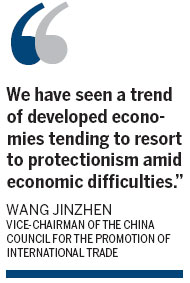
|
A solar panel plant in Lianyungang, Jiangsu province. The United States decided to impose steep tariffs on Chinese solar panel imports, ranging from 18.32 percent to 249.96 percent, and the European Union is also investigating imports of solar products from China. Si Wei / For China Daily |
Development of western regions, domestic market to fuel growth
The European Union and the United States should not resort to protectionism to keep up with China's quick pace of economic growth, which may occur at an annual rate of 7 percent in the coming two decades, said a senior trade official.
"I am quite confident that China's huge domestic market and the further development of its western regions can sustain an annual growth rate of between 7 and 8 percent in the coming 20 years," Wang Jinzhen, vice-chairman of the China Council for the Promotion of International Trade, said on Thursday in Brussels.
Wang called on advanced economies to cooperate more with China instead of resorting to confrontation and trade protectionism.
Wang, who is in Brussels to attend Global Chamber Platform meetings, which bring together international and national chambers of commerce from around the world, said China's economic growth will stem mostly from its development of its western regions and its infrastructure construction, as well as its ability to unlock its market's huge purchasing potential.
Chambers of commerce throughout the world, in an annual report released in Brussels on Thursday, reached a consensus about the need for free trade and pumping energy into the real economy, the part of the economy concerning goods and services.
Wang said having a meeting of the minds is important for China's economic growth and global integration.
Wang said China isn't likely to maintain the double-digit rate of economic growth it has seen every year on average in previous decades but can grow at a "relatively fast" pace in the coming years.
"I think advanced economies should come up with more ways to cooperate with China," Wang said.
"A change in attitude can help the United States and the European Union walk out of economic stagnation earlier."
Wang complained that the the EU and US have behaved unfairly to Chinese companies even though leaders in those places routinely say that free trade and investment are essential to economic growth.
Wang said the US' recent investigation into Chinese telecom giant Huawei Technologies Co Ltd is an example of a protectionist measure that has been imposed on a Chinese company in the name of national security.
Wang also said the EU's recent decision to start an anti-dumping investigation into the activities of Chinese solar panel companies has harmed their European counterparts, saying companies in both places frequently do business with each other.
"We have seen a trend of developed economies tending to resort to protectionism amid economic difficulties," Wang said.

He added that China's economic slowdown will bottom out in the fourth quarter of the year, saying developed economies should maintain their confidence in China's economy.
Sylvain Plasschaert, a member of the advisory board for the European Institute for Asian Studies, said China's current growth is evidence that its economy is performing well.
Plasschaert said: "The 7.4 percent seen in the third quarter is a good figure for me. I even think it is acceptable if China grows at something like a 6 percent growth rate annually in the future."
"Some people think that things are slowing down in China. I don't believe so, because the economic base is becoming bigger and bigger and the economy is becoming stronger and stronger."
Amid the increasing difficulties posed by environmental and resource constraints, China will remain an engine of the world economy, though perhaps less of one than in previous years, he said.
Plasschaert said China's emphasis on realizing the full potential of its domestic market means it will import more in the future. He added that middle-class Chinese will be in a position to buy more and thus make a tremendous contribution to economic growth.
He said China will soon find itself amid an improved global economy, noting that the US housing market is starting to show signs of recovery.
"And here, in Brussels, we are going to see a summit that may bring more good news and help stabilize the European economy," Plasschaert said.
Liu Jia in Brussels contributed to this story.
fujing@chinadaily.com.cn
(China Daily 10/19/2012 page13)







